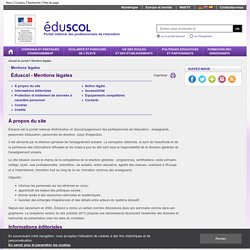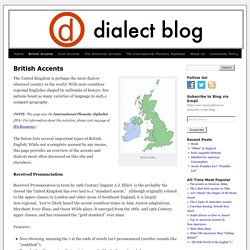

BRITAME. Mentions légales - Mentions légales. À propos du site Éduscol est le portail national d'information et d'accompagnement des professionnels de l'éducation : enseignants, personnels d'éducation, personnels de direction, corps d'inspection.

Il est alimenté par la direction générale de l'enseignement scolaire. La conception éditoriale, le suivi de l'exactitude et de la pertinence des informations diffusées et les mises à jour du site sont sous la responsabilité de la direction générale de l'enseignement scolaire. Le site éduscol couvre le champ de la compétence de la direction générale : programmes, certifications, école primaire, collège, lycée, voie professionnelle, orientation, vie scolaire, action éducative, égalité des chances, ouverture à l'Europe et à l'international, formation tout au long de la vie, formation continue des enseignants. Objectifs : Depuis son lancement en 2000, Éduscol a connu un certain nombre d'évolutions dans son sommaire comme dans son graphisme. Informations éditoriales Éditeur Directeur de publication. Modules d'apprentissage interactifs et multimédia.
Conditions d'utilisation. This summary is designed to help you understand some of the key updates we’ve made to our Terms of Service (Terms).

We hope this serves as a useful guide, but please ensure you read the new Terms in full. Welcome to YouTube! This section outlines our relationship with you. It includes a description of the Service, defines our Agreement, and names your service provider. Key updates: Service Provider. Who May Use the Service? This section sets out certain requirements for use of the Service, and defines categories of users. Age Requirements. Your Use of the Service This section explains your rights to use the Service, and the conditions that apply to your use of the Service. Google Accounts and YouTube Channels.
Your Content and Conduct This section applies to users who provide Content to the Service. License. Account Suspension and Termination This section explains how you and YouTube may terminate this relationship. Terminations. About Software in the Service Software Licences. Our liability. British_and_American_English. Differences between British English and American English. Vocabulary Exercises English. Bases de la conversation anglaise pour débutants avec expressions courantes. English speaking countries. English conversation phrases and expressions for speaking practice. The British Accent Quiz. BRITISH V.S. AMERICAN ACCENTS! British Accents and Dialects.
Wikimedia The United Kingdom is perhaps the most dialect-obsessed country in the world.

With near-countless regional Englishes shaped by millennia of history, few nations boast as many varieties of language in such a compact geography. (NOTE: This page uses the International Phonetic Alphabet (IPA). For information about this notation, please visit my page of IPA Resources.) The below lists several important types of British English. Received Pronunciation Received Pronunciation (a term by 19th Century linguist A.J. Features: Non-rhoticity, meaning the r at the ends of words isn’t prounounced (mother sounds like “muhthuh”).Trap-bath split, meaning that certain a words, like bath, can’t, and dance are pronounced with the broad-a in father.
Speech Samples: Cockney Cockney is probably the second most famous British accent. Estuary English (Southeast British) Estuary is an accent derived from London English which has achieved a status slightly similar to “General American” in the US. Geordie 1. Regional accents of English. How to Speak in a British Accent: 11 Steps.
Edit Article3,176,770 views 238 Editors Edited 1 hour ago Six Parts:R'sU'sHeavy consonantsT'sPronunciationListening and copying Accents that are particular to England, Scotland, Northern Ireland and Wales are each different and with practice you can begin to talk with one that sounds genuine.

Along with the accents are mannerisms that you will need to assume to affect the part. The following directions may describe Queen's English or "Received Pronunciation" (RP) spoken in south England and Wales, rarely ever used in the modern-day United Kingdom, but the foreigners' stereotypical view of how the British talk.